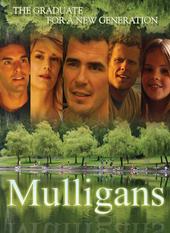
The Descendant
Philippe Spurrell’s feature debut is an intriguing story revolving around a small community, and its shared secret past history, and how an outsider pushes those secrets to the surface for all to see.
Since the film does rely on the element of surprise for it to work as a mystery, I will not be too explicit on the story itself, but will concentrate on the crafting of the film.
I saw the film digitally projected in a setting that did not in any way detract from the lush images on the screen. Mr. Spurrell was available for a short Q and A after the show, and explained that due to financial reasons up to this point, he could not produce a sub-titled 35mm print to exhibit yet; although I hope that with increasing interest in the film by Quebec historical scholars as well as film critics and/or professors, that situation will lead to an influx of extra funds required for this to be remedied soon.
The story begins in Montreal with the main protagonist, James, finding a few details of his past via an old shoebox, left to him by his mother, full of old photographs and birthday cards from his grand-parents whom he had no contact with since he was 3 years old. His partner, Kim, suggests that he should go and visit them to re-establish contact with his past, and possibly find answers to the reasons his mother exiled herself from her family.
When James reaches the small isolated community of St-Harmonie, Quebec, he finds himself warmly welcomed by an old friend of his Mother’s, but looked on with suspicion by others in the local bar.
James meets up with his Grand-Parents at their farm, and intends to stay for a few days. He proceeds to unearth stories about his Mother’s past, and finds deep secrets that the community collectively keeps buried deep in their history.
The film makes for a very good mystery, and succeeds on many other levels as well; but to reveal those would be to give too much away.
The cinematography by Lorenzo Negri and Ivan Gekoff (CSC) is quite sumptuous and serves the story well. The muted colours and close attention to the surface details and textures of the surroundings is very reminiscent of Kim Ki-Duk’s “The Isle” (the look of the farmhouse and the wood specifically).
The art direction, the costumes that were created for the inhabitants of the little community (literally transports the viewer in a past era; trucks and vehicles being the only details of a vague contemporary setting once James is at the farm.
There are fabulous shots over the farm’s windswept cornfields that beg the question of how they were achieved with such a small budget (I did not want to ask the question of how they did it in order to maintain the illusion in my mind).
The actors delivered very convincing performances that at first glance appear off-kilter, but as the film progresses, you realize how true they are for the characters involved; I would say almost Lynchian in subtlety (specially the grand-father played by Jim Reid).
The sound design by Dan Lagacé and music by David Kristian are absolutely outstanding; he does not overwhelm you with recognizable themes, and the background sound effects are so subtle that they induce the mohawk effect (as one of “The Exorcist”’s sound designers was referring to his own sound work was meant to achieve in that film); the hair at the back of the neck definitely rises.
For a film that was shot over the span of 5 years on a shoestring budget, the continuity is spot on and doesn’t betray the lack of funds.
Philippe Spurrell has really achieved a great deal with this film which is garnering interest across a broad spectrum of History and Film scholars, and the public at large.
The story explores a little known part of our local history, and makes a strong case for re-examining it in greater detail so that future generations realize how similar we (as a nation) were to our American neighbors.
The filmmakers should congratulate themselves on a job exceedingly well done.
I strongly urge the public to go and see this film wherever possible; one of the best Quebec English Canadian films (yes they are distinct from the rest of English Canadian films) I’ve seen in a long while.
Mark Penny
Production Team
Executive Producer: PHILIPPE CHABOT
Co-producer: DAVID RIGBY
Producer/Director: PHILIPPE SPURRELL
Written by : PHILIPPE SPURRELL & JOEL MILLER
Cinematography: LORENZO NEGRI & IVAN GEKOFF (CSC)
Editor: ERIC LAVOIE
Music: DAVID KRISTIAN
Sound design: DAN LAGACE
Make-up FX: CJ GOLDMAN, (DAWN OF THE DEAD, DAY AFTER TOMORROW, LUCKY NUMBER SLEVIN)
Special Participation: SERGIO MACHADO





































